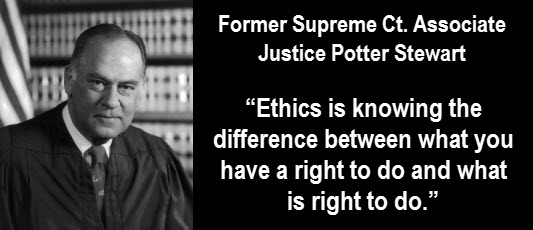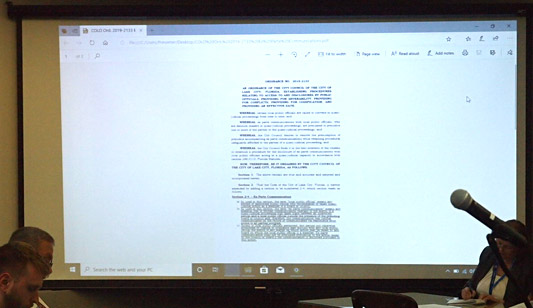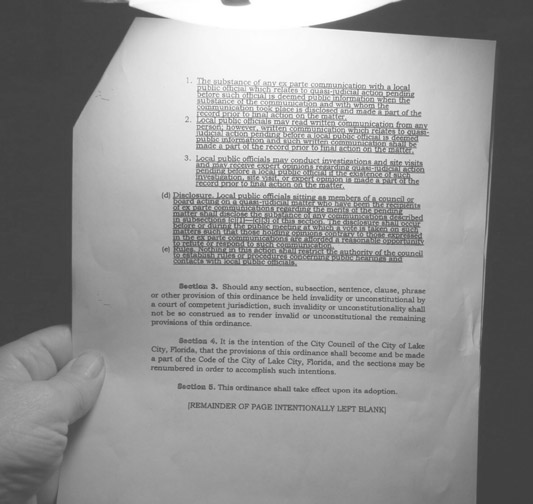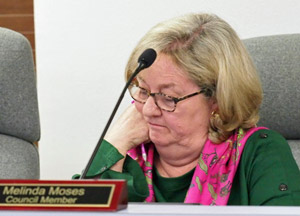Lake City, City Council Says 'Yes' to Ethics – 'No' to Ex Parte Communication
Posted February 5, 2020 09:30 pm

Observer graphic
LAKE CITY, FL – Monday night, except for Councilwoman Melinda Moses, the City Council stood tall against in-the-shadows conversations with developers, their agents, and others coming before the Council or its subordinate boards engaging in quasi-judicial hearings or proceedings.
Background:
In 1991, in a case that became known as Jennings, the District Court of Appeal of Florida (Third District) ruled that: "... upon proof that a quasi-judicial officer received an ex parte contact, a presumption arises, pursuant to section 90.304, Florida Statutes (1989), that the contact was prejudicial. The aggrieved party will be entitled to a new and complete hearing before the commission unless the defendant proves that the communication was not, in fact, prejudicial."
Quasi-judicial hearings implement policy and involve the application of a policy to a specific development application.This is opposed to quasi-legislative hearings which set policy, i.e., formulating policy rather than applying specific rules to a certain situation, which would be done in a quasi-judicial hearing.
Examples of quasi-judicial hearings would be those that rule on site specific zonings, conditional use permits, variances, and site plan approval.
Ex parte communication means any material oral or written communication relevant to the merits of a proceeding that is neither on the record nor on reasonable prior notice to all parties.
Based on Jennings, the Florida Legislature in 1995, passed section 286.0115 of the Florida Statutes, which gave local governments the authority to pass ordinances or resolutions requiring disclosure of ex parte communications before a board takes final action.
Local governments were also empowered to do nothing or add language to their code of ethics rules or other rules to cover ex parte communications in quasi-judicial atmospheres.

Projected on the screen in the Council chambers,
the unreadability of the ordinance was obvious.
Monday Evening in the Council Chambers
On Monday evening, for the third time, Ordinance No. 2019-2133, an ordinance dealing with ex parte communication, came before the City Council.
The ordinance, prepared by City Attorney Fred Koberlein, Jr., and inserted in the agenda by the City staff, was almost unreadable and it was not clear if any of the council members had actually read it before the Council meeting.
The City agenda had the wrong date for the first reading of the ordinance; neither the City Attorney, nor anyone from the City staff, explained the ordinance.
None of the Council members had any questions.
During the public hearing it was pointed out that it was disgraceful the way the ordinance looked, with your reporter holding up the ordinance and telling the Council, "Nobody can read it."

This is the copy which was held up for the
Council to see. The underlined portions are the
substance of the ordinance.
He said, "It's a disgrace the way this looks. Anybody that's familiar with what's going on in Washington today knows that ex parte communication, which means that people talk with you and you're not around the board.... You don't have to approve this [the ordinance] tonight."
"But if you haven't read this and it's kind of late to do it now: this absolves the board from having ex-parte communication on certain matters that are coming before the City Council, but makes it fine, if you announce at the specific meeting of the Council that you've met with these people."
"This [law] was passed by the legislators in Florida to say, 'Hey' - you know -- you're really not supposed to meet with folks, but if you do and announce that you met with folks, then it's ok. But then you are supposed to tell them what you met about... This absolves you guys from potentially doing the wrong thing."
Failing to mention that one had ex parte communication does not invalidate the action of any board, nor is there any punishment of the offender.
Your reporter continued, "You can have a policy that says you can't meet with people in secret -- you see all the conflicting things that are going on in Washington right now. You have the ability to do that... That's part of what the problem is in America today."
Your reporter concluded, "I would respectfully ask you look at this. It can be done by resolution at any meeting."
There was a long pause before Mayer Witt asked for a motion. One could see the Council members furiously trying to read the proposed ordinance.

Councilwoman Moses reflects after no one
seconded her motion to approve the ordinance.
"Is There a Motion"
Finally, Mayor Witt asked, "Is there a motion?"
Councilwoman Moses wasted no time, "Move for adoption."
There was a long pause.
Mayor Witt looked around and asked, "Is there a second?"
The Mayor waited. Some Council members were still reading. Those in attendance watched. One could hear a pin drop.
No one spoke.
Mayor Witt announced, "Without a second, the motion fails."
The Council continued with its other business.
